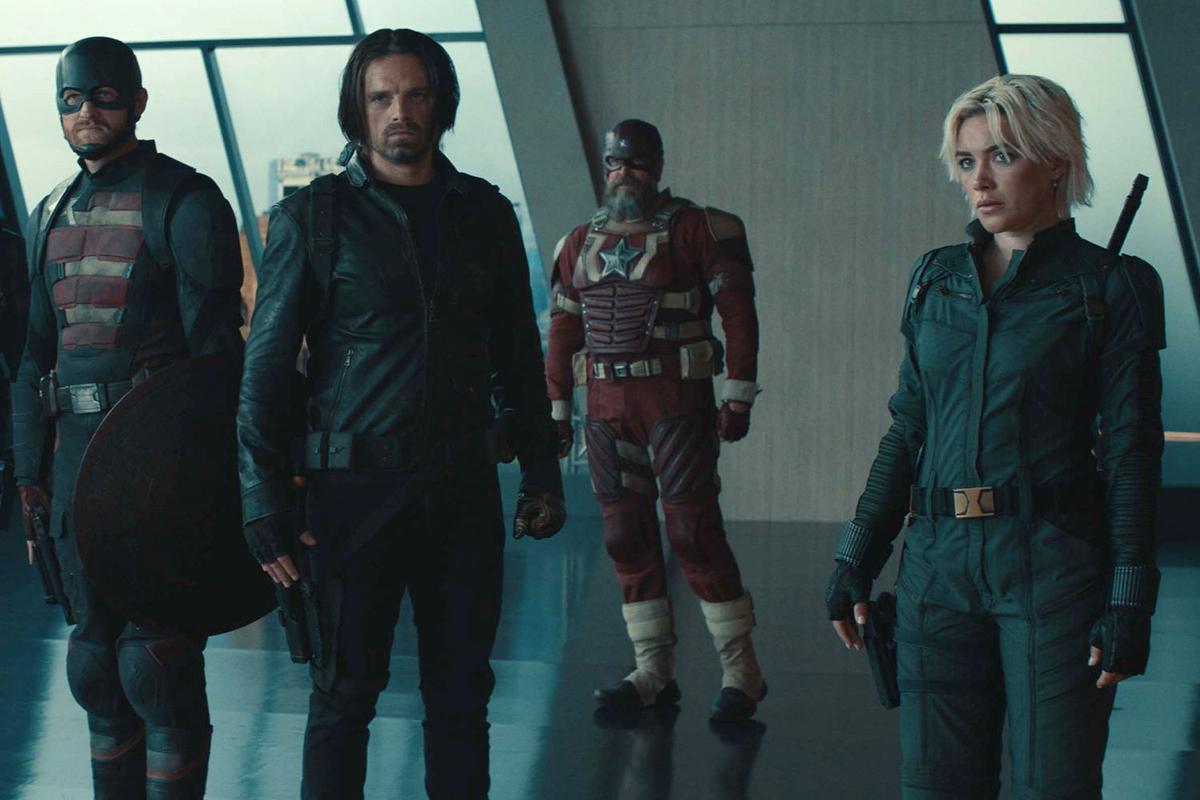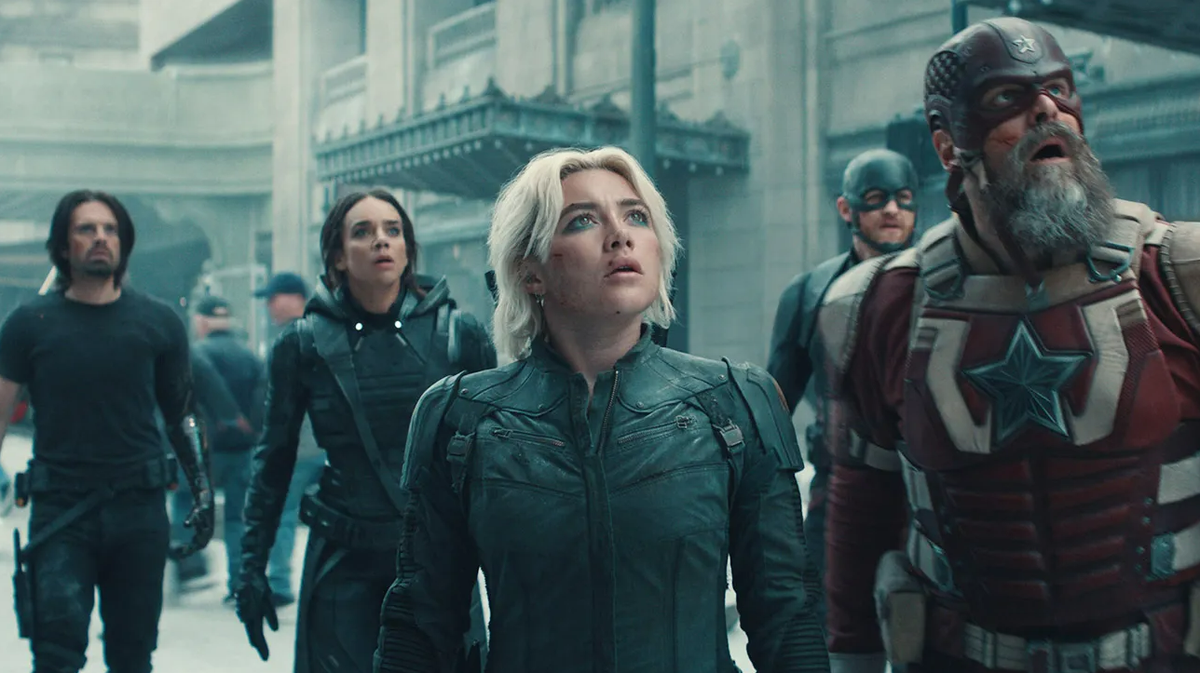With Thunderbolts* (the asterisk denotes a little something that’s worth ceasing all phones at early screenings), Marvel Studios offers a strange something. Not a new beginning, not even an end, but a reluctant middle piece to its dwindling self-worth nearing the conclusion of Phase-5. After a decade-plus of spandex operatics, cosmic showdowns, and multiversal migraines, we’ve arrived at the era of mid-tier misfits and discards. The Avengers are either dead, de-aged, or trapped in development hell. The remaining bench is a set of weary characters staring down the abyss of their own irrelevance.
A former child assassin, a disgraced Captain America knockoff, a super-assassin turned congressman, a haunted quantum blur, a Soviet relic, and a human emotional contagion named Bob. They’ve been shelved, sidelined, and mostly forgotten — by their government handlers, by the world they supposedly saved, and, most damningly, by their jaded audiences who’ve long since moved on. What throws Thunderbolts* a lifeline in the slow, defibrillator rhythm of a post-Endgame Marvel is that Kevin Feige has finally started to admit that the party might just be over.
Thunderbolts* (English)
Director: Jake Schreier
Cast: Florence Pugh, Julia Louis-Dreyfus, Sebastian Stan, David Harbour, Wyatt Russell, Hannah John-Kamen, Lewis Pullman, Geraldine Viswanathan
Runtime: 126 minutes
Storyline: Ensnared in a death trap, an unconventional team of antiheroes embarks on a dangerous mission that forces them to confront the darkest corners of their pasts
Once a promising successor to her late sister Natasha Romanoff’s Black Widow, Florence Pugh returns as Yelena Belova, still mourning her sister, still drolly Russian, and still the Phase-5’s most emotionally legible performer. She wears her disillusionment like a second skin and her job is no longer to avenge, but to merely trudge along begrudgingly, and that’s proving more difficult by the day. “Maybe I’m just bored,” she says early on, which feels like a discerning summation of the post-Endgame age.Thunderbolts* doesn’t solve that problem. But it does acknowledge it with unusual clarity, and that alone makes it one of Marvel’s more human efforts in years.

Director Jake Schreier (of Robot & Frank and the 2015 adapatation of John Green’s Paper Towns) brings a light indie touch to the proceedings. He doesn’t seem particularly interested in the convoluted lore or flashy pyrotechnica of modern superhero fare, and instead, lets his cast rattle around in desaturated corridors and puts them in vulnerable spots. No one could reinvent the MCU at this point, but he does subtly redirect it.
The plot, as is often the case, is the weakest link. CIA head honcho Valentina Allegra de Fontaine (Julia Louis-Dreyfus, whose dry wit is underserved by the script) tricks our assorted antiheroes into a mission that’s really a death trap. One by one, they realise they’ve been sent to eliminate each other, and we soon get a slow-burn mutiny of sad-eyed soldiers who would rather hug it out than throw punches, at least most of the time.

A still from ‘Thunderbolts*’
| Photo Credit:
MARVEL STUDIOS
David Harbour’s Red Guardian continues his grumpy dad routine with winning goofiness. He gets some of the film’s funniest lines (Yelena’s pee-wee soccer team becomes an ongoing source of oddly affecting pride), but his real role is to tether the film’s sky-high gloom to something earthbound and foolishly tender. Sebastian Stan’s Bucky Barnes also reappears, with a more grounded gravitas that reminds you he once had a more engaging storyline. Wyatt Russell’s John Walker, still festering from The Falcon and the Winter Soldier, scowls his way through a majority of the film, and Hannah John-Kamen’s Ghost remains half-formed, but that feels appropriate — her power is literally to phase in and out. And Olga Kurylenko’s Taskmaster… well.

These are characters stuck in a kind of cinematic purgatory. They’re not quite important enough for franchise salvation, but not disposable enough to be killed off. They’re the narrative flotsam of past installments, with enough courage to question what actually happens to a superhero deferred. The action is competent but rarely thrilling and the colour palette leans hard on shadows and grime. But amid the industrial drabness, a freshness takes form and the characters begin to breathe.
The new wildcard is Lewis Pullman’s Bob, a fragile, mumbling superbeing with the power to make people feel the worst thing about themselves. That his supposedly omnipotent abilities are practically weaponised depression is quite telling. When he loses control, he becomes a living fog of despair, swallowing blocks of Manhattan in shapeless, shadowy grief. It’s a heavy metaphor, but Pullman sells it with a twitchy, wounded sincerity. Bob is the first Marvel character in ages who seems genuinely surprised (and a little terrified) to be in a Marvel movie.

A still from ‘Thunderbolts*’
| Photo Credit:
MARVEL STUDIOS
It’s actually through Bob that Thunderbolts* achieves its most ambitious emotional swing. This rag-tag group of “disposable delinquents” isn’t trying to stop a bad guy so much as stop being the bad guys, and their arcs aren’t driven by fate or destiny, but by therapy-adjacent self-reflection. In the end, it all leads back to Yelena, whose sardonic emotional register makes her a compelling nucleus. Pugh’s performance builds momentum in silence and she’s the only one in the ensemble who seems to understand that the real villain is disconnection.

It’s messy, meandering, and emotionally lopsided, but Thunderbolts* feels like it was made by people who wanted to be there. That’s more than can be said for most Marvel projects in recent memory. That Thunderbolts* feels like a minor miracle in the post-Endgame MCU is less a credit to the film itself than a damning verdict on the films that came before it. It’s a modest movie, practically allergic to MCU chutzpah, and yet it succeeds where so many others have failed.
Thunderbolts* is currently running in theatres
Published – May 01, 2025 01:02 pm IST




































